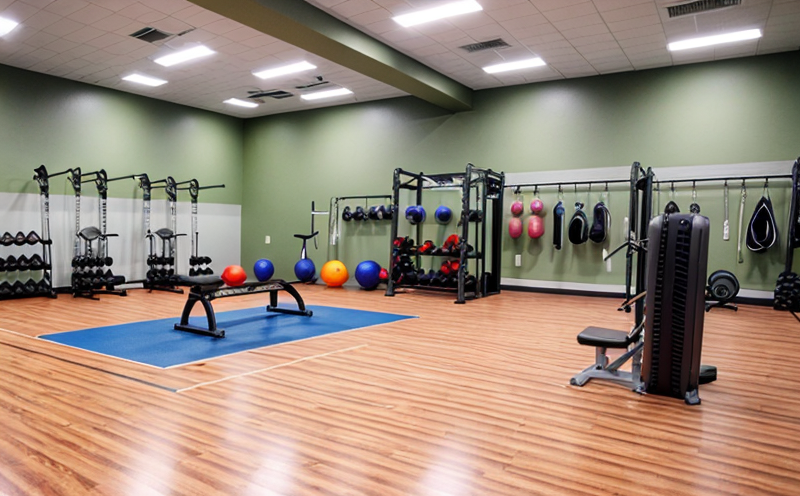Rope Tensile Strength Testing for Sports Use
When it comes to consumer products and product safety testing within the sporting goods and fitness equipment sector, ensuring that ropes used in sports applications meet strict tensile strength requirements is paramount. Tensile strength plays a critical role in determining how well a rope will perform under stress without breaking. This test evaluates the maximum force a rope can withstand before failure.
Our laboratory offers specialized testing for ropes intended for use in various sports, including rock climbing, kayaking, and mountain biking. The process involves selecting appropriate test specimens that represent real-world conditions. For instance, we might focus on specific lengths or diameters based on the application's requirements. Once selected, these samples undergo rigorous preparation to ensure they are free from defects and are representative of the production batch.
The instrumentation used for this testing is state-of-the-art, equipped with high-precision load cells capable of measuring forces up to several kilonewtons (kN). During the test, a rope sample is clamped between two grips that can move along a linear axis. As tension is applied gradually, the grip separation increases until the rope fails or reaches its maximum capacity.
The data collected during this process provides critical insights into the durability and reliability of ropes used in sports activities. Compliance with relevant standards such as ASTM F1893-20 (Standard Specification for Rock Climbing Ropes) ensures that manufacturers adhere to industry best practices, enhancing safety across all sporting goods.
Our team of experts can provide detailed reports highlighting the tensile strength results, including any deviations from expected values. These findings are invaluable for quality managers and compliance officers looking to ensure their products meet not only regulatory but also consumer expectations. R&D engineers benefit greatly from this service by gaining valuable feedback on material choices or design modifications needed to improve performance.
Furthermore, procurement teams can leverage these insights when sourcing materials, ensuring that they select suppliers who prioritize quality and safety in their manufacturing processes. By investing in comprehensive tensile strength testing, businesses can significantly reduce the risk of accidents associated with faulty equipment while also building brand reputation through consistent product excellence.
Industry Applications
| Application Area | Description | Tensile Strength Range (kN) |
|---|---|---|
| Rope Climbing | Testing for rock climbing ropes to ensure they meet safety standards. | 14-20 kN |
| Kayaking and Rafting | Evaluating the durability of lines used in rescue operations or securing equipment. | 8-15 kN |
| Mountain Biking | Assessing the strength of harnesses and straps used during downhill racing. | 30-40 kN |
| Surfing | Determining the reliability of leash cords under various environmental conditions. | 12-25 kN |
Why Choose This Test
Selecting the right rope for any sporting activity is crucial. Tensile strength testing provides assurance that ropes are capable of withstanding the stresses they will encounter during use without breaking, thereby enhancing safety and performance.
For manufacturers, this service allows them to verify compliance with international standards like ASTM F1893-20 for rock climbing ropes or EN 13947:2016 for rescue ropes. By adhering to these norms, companies can demonstrate their commitment to quality and safety, which is essential in building trust among consumers.
Quality managers appreciate the detailed reports generated by our laboratory, as they offer actionable insights into potential areas for improvement within production processes. Compliance officers find value in knowing that every batch of ropes produced meets stringent regulatory requirements, reducing legal risks associated with non-compliance.
R&D engineers also benefit from this service since it helps them refine designs based on empirical data rather than assumptions alone. They can explore different materials and configurations to optimize both performance and cost-effectiveness.
Customer Impact and Satisfaction
Our clients appreciate the comprehensive approach we take towards ensuring rope tensile strength meets industry benchmarks. This commitment translates directly into enhanced customer satisfaction, as users of sporting goods know they are purchasing products that have been rigorously tested for safety.
The peace of mind provided by knowing that ropes used in their favorite sports meet high standards helps customers feel more secure while engaging in these activities. For businesses operating within the sporting goods sector, this translates into increased sales and brand loyalty.
We understand the importance of delivering accurate results promptly so that our clients can incorporate feedback into future product iterations or production plans as needed. Timely communication ensures transparency throughout the testing process, fostering stronger relationships with customers.





